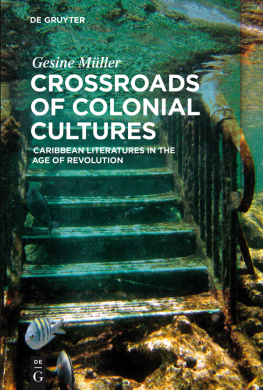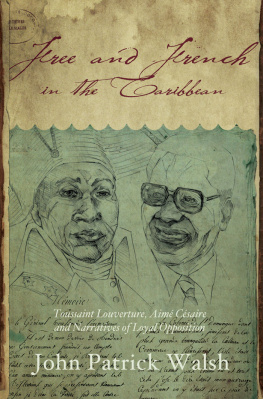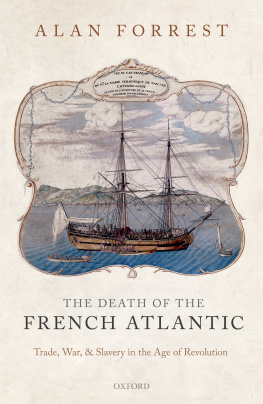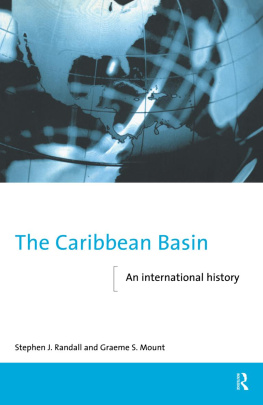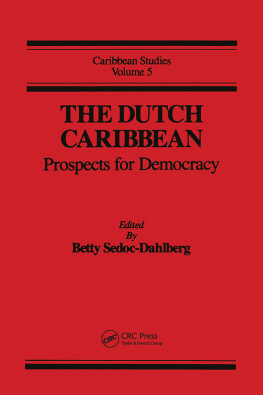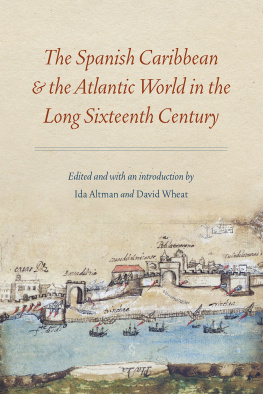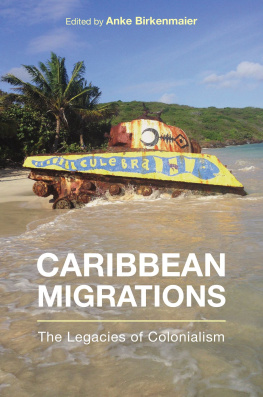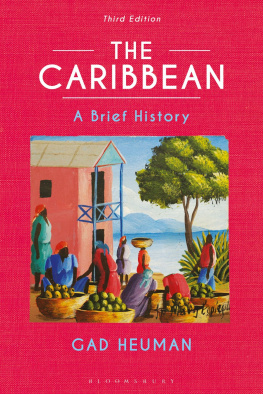Contents
Guide

Gesine Mller
Crossroads of Colonial Cultures
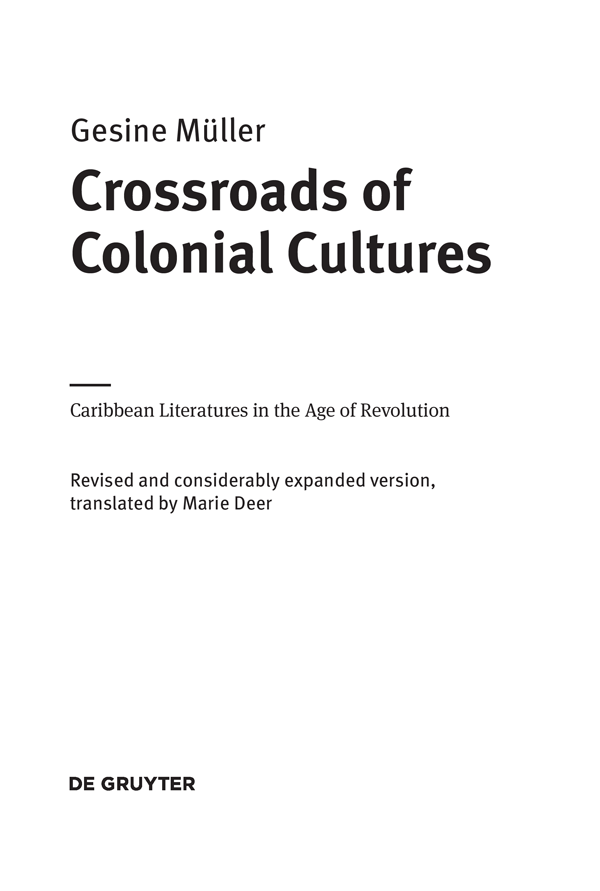
Original title: Die koloniale Karibik. Transferprozesse in frankophonen und hispanophonen Literaturen (De Gruyter 2012)
ISBN 978-3-11-049500-3
e-ISBN (PDF) 978-3-11-049541-6
e-ISBN (EPUB) 978-3-11-049233-0

Dieses Werk ist lizenziert unter der Creative Commons Attribution
NonCommercial-NoDerivatives 4.0 Lizenz. Weitere Informationen finden Sie unter
http://creativecommons.org/licenses/by-nc-nd/4.0/.
Library of Congress Control Number: 2018936209.
Bibliographic information published by the Deutsche Nationalbibliothek
The Deutsche Nationalbibliothek lists this publication in the Deutsche Nationalbibliografie; detailed bibliographic data are available on the Internet at http://dnb.dnb.de.
2018 Gesine Mller, published by Walter de Gruyter GmbH, Berlin/Boston
Cover image: ThePaul/photocase.de. Gestaltung: Tobias Kraft
www.degruyter.com

For my parents
IIntroduction
I.1The Colonial Kaleidoscope of the Caribbean
A look at the kaleidoscope-like world of the nineteenth-century Caribbean can give us completely new insights into the early processes of cultural globalization; phenomena of which we are only now becoming aware were anticipated there. Racist discourses, established models of white abolitionists, the politics of memory, and the role of the Haitian revolution (which for a long time was barely recognized) form an amalgam that puts our conventional understanding of a genuinely Western modernity into question.
Migration, circulation, and interconnections among the most diverse geographical areas, along with rootlessness and a lack of direction, are considered to be characteristics of our societies of today. But these phenomena of deterritorialization can already be observed in the Caribbean islands in the nineteenth century, where, for example, pirates and slave traders sailed back and forth between empires and continents; writers fled from one exile to the next; and illiterate peddlers served as messengers between worlds. This is what makes the nineteenth-century Caribbean a fascinating starting point for the examination of the (cultural) fracture points of colonial systems that finally end in cultural (and political) emancipation.
The nineteenth-century world of the Caribbean islands can be read as a kaleidoscope of colonial structures and dynamics, in which colonial experiences come together in a dense network within the sphere of influence of a great variety of hegemonic and peripheral systems and give rise to dependence and separation, to exchange and confrontation. This study focuses on the processes of cultural transfer that play out in, are directed towards, or originate from the Caribbean in a particularly fascinating phase of the colonial transition period, to which little attention has been paid: the years 1789 to 1886, from the French Revolution, with its proclamation of human rights and the immediate effects on the revolutionary events in Haiti, to the abolition of slavery in Cuba (1880 to 1886). Within this time period we can see an intense distillation of the experiences that take place between dependence and independence.
Some voices, taken from documents of that time, will convey an impression of this Caribbean kaleidoscope, already strongly shaped by global interconnect
Or to move to another scene: fathers and sons in Guadeloupe. Apaternal lecture in Levillouxs 1835 Les croles ou la Vie aux Antilles :
My son I believe I can see in your letters a marked tendency to become passionate about these dogmas that you call regenerative, but that can only be that after they have killed us. Beware of making yourself equal through bonds of friendship with compatriots of color. Do not look only at external signs; they can be misleading. (23)
The son in this case had left Guadeloupe to study in Paris, which is where he had been contaminated by these ideas: philanthropic, revolutionary ideas that put slavery into question. Reason enough for the father to want to show the son the error of his ways. (After his return, the son did indeed finally convince himself that slavery was in fact the most humane inventionfor blacks.)
Or, to change the scene again: in Gmez de Avellanedas abolitionist novel Sab , a slave (the title character) speaks for himself: I have no homeland to defend, because slaves have no homeland (Servera edition 36). Statelessness at the height of nationalism!
Or, again: turmoil for Maynard de Queilhe, also in 1835. The poet was traveling back home from the French mainland, home to Martinique. As they said their good-byes, Victor Hugo was envying his fellow poet, at least some of the time: Altogether, there are times when I envy you, you a poet exiled in a sunny land, an exile which Ovid would have loved, in that beautiful Martinique
Another change of scenery. Now were in Louisiana, in mid-nineteenth-century New Orleans. The free people of color here are refugees from the Haitian revolution, most of them having come via Cuba. Their descendants have never seen their native Haitian soil, but they want to go back, and their literature strengthens their resolve. In an 1867 story by the Louisianan author Joanni Questy, for example, Monsieur Paul says: My friend, you should send Georges to Haiti. After all, he is smart, young, talented, and not superstitious. He will find his way in that country. Georges has an awe-inspiring feeling for freedom. Dont forget that, my friend.
Transatlantic solidarity was even announced on street signs, for example in the Calle OReilly in Old Havana: Two island peoples in the same sea of struggle and hope, Cuba and Ireland (Adams). Irish emigrants were mostly drawn to the British colonies of Barbados and Jamaica, but many also landed in Cuba.
The anti-slavery Parisian journal Revue des Colonies (Journal of the Colonies), which was read throughout the French colonies, started dreaming of a future mixing of the races in the early eighteen-forties (even before slavery was abolished). These ideas can be found again just a few years later among the progressive intellectuals of Cuba:
These whites, blacks, and reds will become a new mixed race of Europeans, Africans, and Americans. In a few generations and after various intermixings, they will create new colors:
In 1870, Eugenio Mara de Hostos, from Puerto Rico, gave voice to the crucial issue that haunts the entire nineteenth century. In a speech, he asked the question:
What are the Antilles? in the same way that elsewhere the question was being asked, what is Germany, what is France ? Was he talking about a pan-Antillean nationalism, la Bolivar? His answer disabuses us of any such idea. Once again, we feel transported into the twenty-first century: he went on to say that the Antilles are the bond, the connection between the fusion of European standards and ideas in North America and Latin America. They are the natural geographic median between both parts of the continent as well as the producers of a transcendental fusion of races the definitive crucible of races. (Diary, March 28, 1870)

